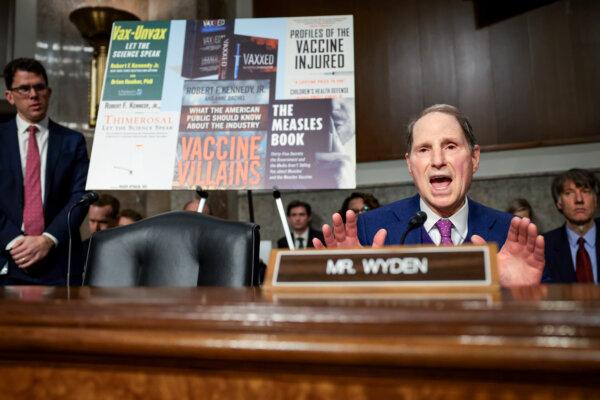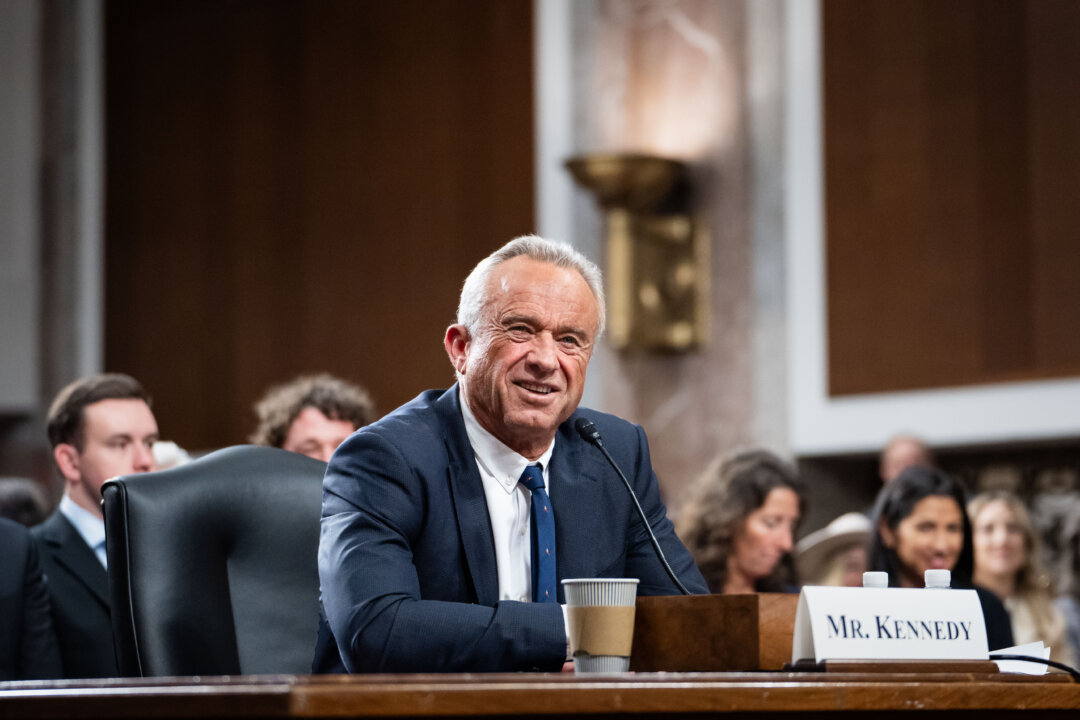The Senate voted 52–48 to approve Trump’s nominee to lead the nation’s most prominent health department.
Robert F. Kennedy Jr., whose nomination by President Donald Trump as secretary of health and human services was highly scrutinized by lawmakers, was confirmed to that post by the Senate on Feb. 13 in a 52–48 vote. He was sworn in at the Oval Office later on Feb. 13.
Sen. Mitch McConnell (R-Ky.), a polio survivor who previously voiced concerns about Kennedy’s vaccine views, voted against confirming Kennedy—the only Republican to cast a no vote. He also voted against the confirmations of Tulsi Gabbard for national director of intelligence and Pete Hegseth for defense secretary.
Kennedy will head the Department of Health and Human Services (HHS), which manages 13 agencies, including the Centers for Disease Control and Prevention (CDC), the Food and Drug Administration (FDA), and the National Institutes of Health.
Kennedy has promised significant changes throughout the department.
Under the “Make America Healthy Again” campaign as HHS secretary, Kennedy aims to curtail what he calls the chronic disease epidemic by addressing the so-called “corporate capture” of federal health agencies and removing toxic chemicals from the nation’s food supply, among other objectives.
Kennedy has said he believes that little will change for Americans’ health until the influence of giant corporations on the FDA, the CDC, and the Department of Agriculture is addressed.
Kennedy ran for president as a Democrat and then as an independent before leaving the race in August 2024 and backing then-former President Donald Trump.
He previously told The Epoch Times that it was a “heart-wrenching decision” and a necessary step toward achieving his mission of saving Americans from the debilitating chronic disease epidemic.
Upon ending his White House bid, Kennedy established the “Make America Healthy Again” (MAHA) movement and vowed to end the nation’s chronic disease epidemic.
“The first thing I’ve done every morning for the past 20 years is get on my knees and pray to God that He would put me in a position to end the chronic disease epidemic and to help America’s children,” Kennedy said in August 2024, when he decided to endorse Trump.
Fighting chronic disease, improving children’s health, and addressing corporate influence on government agencies, were vital parts of Kennedy’s stated presidential campaign platform.
The Children’s Health Defense founder has also called for a review of advertising rules for pharmaceutical companies and has urged Trump to ban pharmaceutical advertising on TV. He also believes in eliminating liability protections for drug companies.
Kennedy told The Epoch Times in September 2024 that he would revamp the NIH to focus on the causes of autism, autoimmune diseases, and neurodevelopmental diseases instead of developing drugs and serving as an incubator for pharmaceutical products.
When the calendar turned to 2025, Kennedy ramped up his efforts to alleviate the concerns of senators on both sides of the aisle about his views by meeting with multiple lawmakers.
He appeared before the Senate Committee on Finance on Jan. 29 for his first confirmation hearing as Trump’s nominee for HHS secretary.
He was questioned by the Senate Committee on Health, Education, Labor, and Pensions on Jan. 30. In a partisan vote on Feb. 4, the Republican-controlled Senate Committee on Finance voted 14–13 to advance his nomination to the Senate floor for a full vote.
Sen. Bill Cassidy (R-La.), a physician, said he was “struggling” to support Kennedy during the committee’s confirmation hearing. He cited concerns about Kennedy’s views about vaccines.
While critics considered his views “anti-vax” or “anti-science,” Kennedy told the committee he is “pro-science” and “evidence-based.”
Ultimately, Cassidy chose to advance Kennedy to a full Senate vote and supported the nominee on Feb. 13.Kennedy has faced criticism about his perceived vaccine stances since he announced his presidential run. The outcry, mostly from Democrats, has escalated since Trump nominated him to lead HHS.
Comments from lawmakers at the hearings, the Senate Finance Committee vote, and the Feb. 12 cloture showcased a sharp division between parties over Kennedy’s views.
Most Republicans praised Kennedy for his past advocacy work and his emphasis on addressing the nation’s chronic disease epidemic, while Democrats criticized him for his stance on vaccine efficacy.
Before the Feb. 13 confirmation vote, Senate Minority leader Chuck Schumer (D-N.Y.) called Kennedy a “wildly unqualified conspiracy theorist” and urged senators to not support the nominee.
Kennedy has consistently said he is not against vaccines, adding that he is an advocate for vaccine safety, informed consent, and nonpartisan studies of the efficacy of vaccines.
“I’ve never been anti-vaccine,” Kennedy told The Epoch Times in September 2024. “People should have a choice, and that choice should be informed by the best information possible. I’m going to ensure that there are science-based safety studies available, and people can make their own assessments about whether a vaccine is good for them.”
Sen. Ron Wyden (D-Ore.), ranking Democrat member of the Senate Finance Committee, has been an outspoken critic of Kennedy. On Feb. 13, before the roll call, he implored senators one more time to not vote for Kennedy’s confirmation. He called Kennedy a “uniquely unqualified nominee to become our nation’s chief health care officer.”

Multiple Republicans had expressed concerns about Kennedy’s views about vaccines and abortion before ultimately casting their vote for the nominee.
Sen. Susan Collins (R-Maine), one of the few Republicans to have voted against some of Trump’s nominees, told reporters earlier this week that she would back Kennedy. She voted yes on his confirmation.
On Feb. 12, Sen. Lisa Murkowski (R-Alaska), another Republican who has not always supported Trump’s agenda, wrote in a post on X that she would vote to confirm Kennedy and followed through with that promise on Feb. 13.
Sen. Mike Crapo (R-Idaho), chair of the Senate Finance Committee, offered support for Kennedy before the confirmation vote took place on Feb. 13.
“Contrary to the attacks that have constantly been made on him, he has made it very clear that he will support safe vaccinations and just wants to see that the research on it is done and done well,” Crapo said.
“When his nomination for the role of Secretary of HHS was announced Mr. Kennedy stated, we have a generational opportunity to bring together the greatest minds in science, medicine, industry, and government to put an end to the chronic disease epidemic facing Americans. I agree with him, we’ve got to get into the business of making America healthy again.”
He encouraged a “strong yes vote” for confirming Kennedy as HHS secretary.
Dr. James Lyons-Weiler, an advisor to Kennedy, told The Epoch Times in December 2024 that Kennedy “is not anti-pharma; he’s anti-fraud.”
“He’s not anti-vaccine; he’s anti-vaccine injury.”
Lyons-Weiler is optimistic about the impact that Kennedy will have as HHS secretary.
“I believe we’re going to see the most substantial positive increase in overall health among Americans that we’ve ever seen, and we will see the end of narrative-based science,” Lyons-Weiler said.
Trump has said that he will give Kennedy the freedom to investigate the potential link between vaccines and autism if the latter gained Senate confirmation.
Kennedy has said for years that autism in some children is likely tied to childhood vaccines, which some states mandate for all school children.
CDC information shows that about 1 in 36 American children today has an autism diagnosis, compared to 1 in 150 back in the year 2000.

